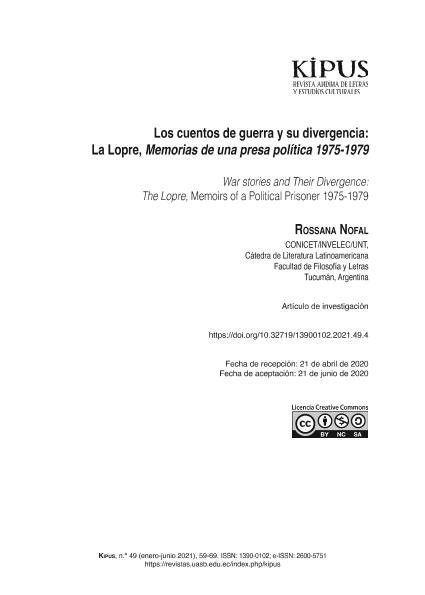Mostrar el registro sencillo del ítem
dc.contributor.author
Nofal, Silvia Rossana

dc.date.available
2023-01-10T13:07:41Z
dc.date.issued
2021-01
dc.identifier.citation
Nofal, Silvia Rossana; Los cuentos de guerra y su divergencia: La Lopre, Memorias de una presa política 1975-1979; Universidad Andina Simón Bolívar; Kipus; 49; 1-2021; 59-69
dc.identifier.issn
1390-0102
dc.identifier.uri
http://hdl.handle.net/11336/184118
dc.description.abstract
La pregunta de María Moreno en el epílogo de Memorias de una presa política 1975-1979 interpela la constitución del corpus de las narrativas testimoniales en sus ejes emblemáticos: el familismo patriarcal y la narrativa de la militancia heroica. La recuperación del manuscrito de Graciela La Lopre con los relatos del cautiverio en la cárcel de Villa Devoto, los procesos de edición, los asedios al legado en el que intervienen Cristina Pinal, Mary Dal Dosso, Graciela Dillet, Cristina Raschia y Silvia Gabarain y la organización del relato en el prólogo de Cristina Feijóo desarman los mitos del testimonio letrado. Autoras por delegación, seudónimo y apodo en común enmarcan la pregunta por la posesión del original y un nuevo pacto autobiográfico en el que los personajes del cuento validan los hechos que la literatura narra. La narrativa romántica del intercambio de las cartas de amor con un hombre y la clausura de la vida con suicidio con barbitúricos en un departamento en París alteran los protocolos heroicos y configuran su doblez divergente. Más allá del modelo binario de la construcción de los sentidos entre los hundidos y los salvados, me interesa explorar cómo, el testimonio letrado del cautiverio de La Lopre, en un doble registro de género literario y sexual, inscribe la violencia política desde una mirada de clase. Es el cuento que cuenta el testigo involuntario de la crueldad. No reconoce un mandato militante para cumplir. No sobrevive para contar.
dc.description.abstract
“What happens when one has to intervene in a text that was written by a literate person although their surname does not necessarily correspond to the Homeland’s makers, but rather to someone who places themselves in a particular place to narrate a recent history?”. María Moreno’s question in the epilogue of Memorias de una presa política 1975-1979 interpellates the constitution of the corpus of testimonial narratives in its emblematic axes: patriarchal familism and the narrative of heroic militancy. The recovery of Graciela La Lopre’s manuscript with her accounts of captivity in Villa Devoto prison, the editing processes, the attempts to siege her legacy with the intervention of Cristina Pinal, Mary Dal Dosso, Graciela Dillet, Cristina Raschia and Silvia Gabarain, and the organization of the narrative in Cristina Feijóo’s prologue dismantle the myths of the literate testimony. Women authors by proxy, pseudonym and common nickname frame the question regarding the possession of the original and a new autobiographical pact in which the characters of the story validate the facts that literature narrates. The romantic narrative of the exchange of love letters with a man and the termination of life by suicide with barbiturates in an apartment in Paris alter heroic protocols and configure their divergent fold. Beyond the binary model of the construction of the senses among the wrecked and the spared, I am interested in exploring how the literate testimony of La Lopre’s captivity, in a double register of literary and sexual genre, registers political violence from a class perspective. It is the story told by the unwitting witness of cruelty. It does not recognize a militant mandate that must be fulfilled. It does not survive to tell.
dc.format
application/pdf
dc.language.iso
spa
dc.publisher
Universidad Andina Simón Bolívar
dc.rights
info:eu-repo/semantics/openAccess
dc.rights.uri
https://creativecommons.org/licenses/by-nc-sa/2.5/ar/
dc.subject
MEMORIA
dc.subject
TESTIMONIO
dc.subject
DERROTA
dc.subject
CUENTO
dc.subject.classification
Estudios Generales de Literatura

dc.subject.classification
Lengua y Literatura

dc.subject.classification
HUMANIDADES

dc.title
Los cuentos de guerra y su divergencia: La Lopre, Memorias de una presa política 1975-1979
dc.title
War stories and Their Divergence: The Lopre, Memoirs of a Political Prisoner 1975-1979
dc.type
info:eu-repo/semantics/article
dc.type
info:ar-repo/semantics/artículo
dc.type
info:eu-repo/semantics/publishedVersion
dc.date.updated
2022-09-22T10:34:04Z
dc.journal.number
49
dc.journal.pagination
59-69
dc.journal.pais
Ecuador

dc.journal.ciudad
Quito
dc.description.fil
Fil: Nofal, Silvia Rossana. Consejo Nacional de Investigaciones Científicas y Técnicas. Centro Científico Tecnológico Conicet - Tucumán. Instituto de Investigaciones sobre el Lenguaje y la Cultura. Universidad Nacional de Tucumán. Facultad de Filosofía y Letras. Cátedra de Literatura Argentina. Instituto de Investigaciones sobre el Lenguaje y la Cultura; Argentina
dc.journal.title
Kipus
dc.relation.alternativeid
info:eu-repo/semantics/altIdentifier/url/https://revistas.uasb.edu.ec/index.php/kipus
dc.relation.alternativeid
info:eu-repo/semantics/altIdentifier/doi/https://doi.org/10.32719/13900102.2021.49.4
Archivos asociados
